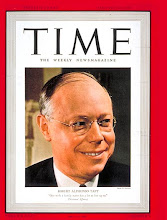Ron Paul's 2008 campaign for the presidency has been met with much resistance and so much enthusiasm that long after the Republican Party knew who it's nominee would be, Paul seems higher than ever.
The Texas congressman's recent book "The Revolution: A Manifesto" creates some hope that the Revolution will last much longer than Dr. Paul's campaign. Whereas Taft Republicanism died along with the Ohio senator, Goldwaterism extended past the senator's disastrous run because his ideals were committed to paper as attested to by all of the revised editions of "The Conscience of a Conservative" which have appeared in recent years. For the same reason, the Ron Paul Revolution has staying power because Paul's political convictions are broadly systematized for a future generation of Ron Paul Republicans. And unlike Paul's other books, which have been merely compilations of his speeches, this is an actual outline of his beliefs.
The book fires its first serious shot at the Bush-Cheney-neocon worldview on page 10: "If the Founders' advice is acknowledged at all, it is dismissed on the grounds that we no longer live in their times. . . . Should we give up the First Amendment because times have changed?" This is a direct blow to the over-used complaint that since 9/11 "everything has changed." Both of the readers of this blog know that I have argued that evil in this world is not any more prevalent now than before 9/11. It is not as though terrorism was invented on that dreadful Tuesday morning. Human nature has not changed and neither has the capacity to inflict pain or retribution. Conservatives are supposed to rely on traditions and the collective wisdom of our ancestors. That wisdom is found in our Constitution, which does not include pre-emptive wars launched by the executive, and Paul follows it loyally.
Paul also shows tremendous character, unlike some of his GOP combatants, by not naming names or resorting to name-calling. On page 24 Paul declines to call out John McCain by name for one of his more absurd comments. In an early debate, the presumptive Republican nominee called Paul an isolationist, an inaccurate label for a non-interventionist, and said that that was the reason for Hitler's rise to power. Despite McCain's historical ignorance (not a first time offense) Paul takes a higher road than I just took.
Chapter 5 is dedicated to the good doctor's defense of civil liberties. The chapter actually serves a two-fold purpose: to defend civil liberties themselves but also to dispel misconceptions that Paul would be too easy on terrorists. Paul shows that interrogations and trials can be lawfully conducted on terrorists according to the Constitution which has been horribly circumvented. It also shows that Bush administration apologists are misguided in their defense that everything must be considered to battle terrorists. As usual, Paul points to the Constitution to solve these quandries, and most importantly, that the Constitution does indeed provide adequate provisions.
Paul's (allegedly) heretical positions include his notorious defense of the decriminalization of all drugs. What was most striking about Paul's rationale for drug legalization is that it strongly resembles the defense of gun owners against gun control laws: if somebody desires something enough, they will get it however they can.
When Bill Kristol and other "Weekly Standard" types have railed on Paul saying that he hasn't liked anything about America in the past 100-150 years, they are not entirely wrong. However, that does not mean Paul is unpatriotic or anti-American. Precisely the opposite: Paul and over 1 million other Republican voters are patriotic because they dislike much of what has been happening in this country: a leviathan of a federal government, inflation of the currency, endless and unnecessary wars, government spending through the roof and a loss of privacy, just to name a few things that have happened during the Bush administration.
But Paul does look optimistically to the future due in no small part to the overwhelming support he has received. Morever, he has received support from people who know that as president Paul would not dictate their lives because he expects them to be self-reliant. Instead of pandering to special interests and describing all he wants to do, Paul emphasizes the personal liberty of the individual. His message, as captured in his little tome, is not What the States can do for You. In short, Paul treats his supporters like adults, not a nation of children or a nation of sheep to borrow the title from Andrew Napolitano's book.
In an election populated by false messiahs and wannabe Napoleons, the campaign of Ron Paul was a breath of fresh air and his book, while it does not contain any campaign stories, does lay a foundation for a future movement.
Let the revolution begin? Let it continue.
Friday, May 16, 2008
Subscribe to:
Post Comments (Atom)















No comments:
Post a Comment